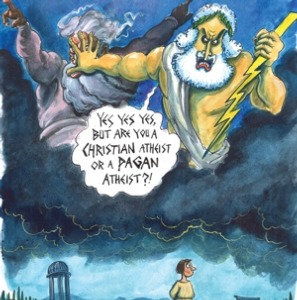Humanism without morality is like air without oxygen. The atheist Stalin was no humanist. Critics of humanism have for centuries declared that freethinkers once departing from religion have abandoned morality. Not so. Developing a public and private moral system and moral sense are essential to the humanist project. An editorial is not the place for a complete philosophical discourse, but some of the issues can be touched on. What is the good? What is good behaviour and how is it inculcated? How is human choice made and can choice be rational? What is "The Nature of Rationality", to use a phrase from Nozick? Does the utilitarian theory of ordering matters "to the greatest good of the greatest number" satisfy without some modification? Is there such an entity as evil? Are we "beyond good and evil" to quote the famous Nietzschean comment? The questions could go on and on.
Humanists believe morality stems from our situation as social animals. Our morality may affect our relations with other than human animals, but as far as we can tell they do not have moral instincts or codes: what morality controls a cat's attitude to a mouse? Altruism has probably developed through evolution and is not equally developed in all people. The codes of behaviour in society come from our social agreements, our social construct of morals that benefit us all. Without the ability to empathise with the distress of others, morality does not operate effectively.
There are no absolute morals, but there are universal values. The so-called diversity of morals between societies does not indicate great differences in morality across different societies. Marriage laws and customs, for instance, may vary enormously from society to society, but caring for others does not. The value of not killing may vary according to whether a country is at war or not. There are no commandments laid down from on high, we have to work it out for ourselves. A random sample of items from one day of a daily newspaper demonstrates how widespread are ethical enigmas. It is in real situations that morality must be worked out. Should we try political leaders such as Milosevic for war crimes? How can responsibility be proven? What punishment could possibly be commensurate with genocide? An item reporting the research findings of the World Prison Brief Online indicates that England and Wales have the second highest prison populations in Europe. Is prison the best way to deal with anti-social behaviour?
People taking class A drugs (cocaine and heroin) cost society millions of pounds a year. These people turn to crime, destroy their families, and often do not contribute to society. As with imprisonment there is the question of what is the best way to deal with this problem. Is reform and restitution possible? Even if costly, the savings to society might be great. Another item points out that Customs lose £7.3 billion a year in fraud. Cigarette and alcohol smuggling may seem fairly minor crimes on the scale of human wickedness. But what has morality to say about tax and fraud? Is fraud justified when a system is seen as unnecessary or unfair? The need to possess more goods and pleasures may be fuelled by envy. A piece of research showed that anonymous participants in a computerised betting game, played with real money, were prepared to spend their winnings in order to burn cash won by other players. The characteristics of greed, envy, anger and frustration cannot be ignored by humanists: the human creature is a very mixed bundle of attributes.
A barrister is suspended for racially abusing a colleague; the Home Secretary calls for an end to enforced arranged marriages. The whole host of problems and issues facing minority groups within society need deep consideration. Is it immoral or just inconsiderate (or are they same?) to insult members of other groups? The Society for the Protection of the Unborn Child (SPUC) is trying to block the sale of the morning-after pill. It argues that pregnancy begins when the egg is fertilised. SPUC's decades of opposition to abortion are here continued. Again there are many moral questions: is it right to prevent unwanted pregnancies? What is life and at what stage does it begin?
This issue of the New Humanist examines a range of ethical enigmas. Philip Pullman, the Whitbread prize-winning author, opens with his own reflections on the responsibility of the storyteller.
Bioethics is a key area, because it so affects the human being. The potential problems and possibilities from genetic research and from cloning are examined by Jonathan Cowie and Richard Norman. The question of applied science and the public understanding of science are seen in the interview with Sir Harry Kroto and Gill Watson's account of the Vega Trust. The distinguished philosopher, Simon Blackburn, in an extract from the Voltaire lecture, argues for humanist values over relativist stances. In the wake of 11 September and the Afghan War, Geoffrey Robertson, the renowned barrister, considers how terrorists should be treated in international law.
Morality, it has often been said, can be caught rather than taught. There has been much talk recently of the 'school ethos'. Keith Porteous Wood looks at the recent parliamentary discussion of Church Schools, and Azam Kamguian excoriates the ethos of Iranian schools. The discussion in parliament of a Partnership Bill presents options for greater commitment and caring for unmarried and same-sex couples. There will always be scope for individual choice, and scope for examination of how choices are made and what they are based on. There will always be problematic ethical issues to deal with: humanists should be at the forefront of the analysis.

